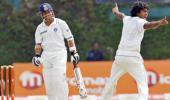A high-level commission appointed by Sri Lankan President Mahinda Rajapaksa to look into the last seven years of conflict with the Liberation Tigers of Tamil Eelam opened public hearings on Wednesday, amid global apprehensions over its credibility and mandate to probe war crimes.
The eight-member 'Lesson Learnt and Reconciliation Commission' recorded the testimony of its first witness, former top diplomat Bernard Goonatilake, who participated in the talks between the government and the LTTE in 2002 and 2003.
The panel will report to the President within six months from the date of appointment, May 15, on the events in the period between February 21, 2002 and May 19, 2009 when the war ended.
The commission opened its proceedings a day after a group of 57 United States lawmakers asked the Barack Obama administration to call an independent international probe into alleged war crimes in Sri Lanka.
The group said such a probe is in the best interest of the US and the people of Sri Lanka to ensure lasting peace after a quarter century of ethnic conflict.
"Such a peace can only be reached once the truth about the past is understood," it said in a letter to Secretary of State Hillary Clinton.
After holding sittings in Colombo this week, the Commission is scheduled to operate from Vavuniya to facilitate the persons in the conflict-affected areas to give evidence and state their grievances.
The commission comprises persons of eminence, representing the multi-ethnic and multi-cultural nature of the Sri Lankan society.
While assessing the conflict phase, the commission will search for any violation of internationally-accepted norms of conduct in such situations. It will also go into the circumstances that may have led to such actions and identify persons or groups responsible for such acts.
It is also expected that recommendations would be sought on the nature of compensation to be granted to the victims or their dependents who have suffered in this conflict situation.
The commission will also look into the institutional, administrative and welfare measures already taken in the post-conflict phase and that should be taken further in order to effect reconstruction, rehabilitation and reconciliation.









